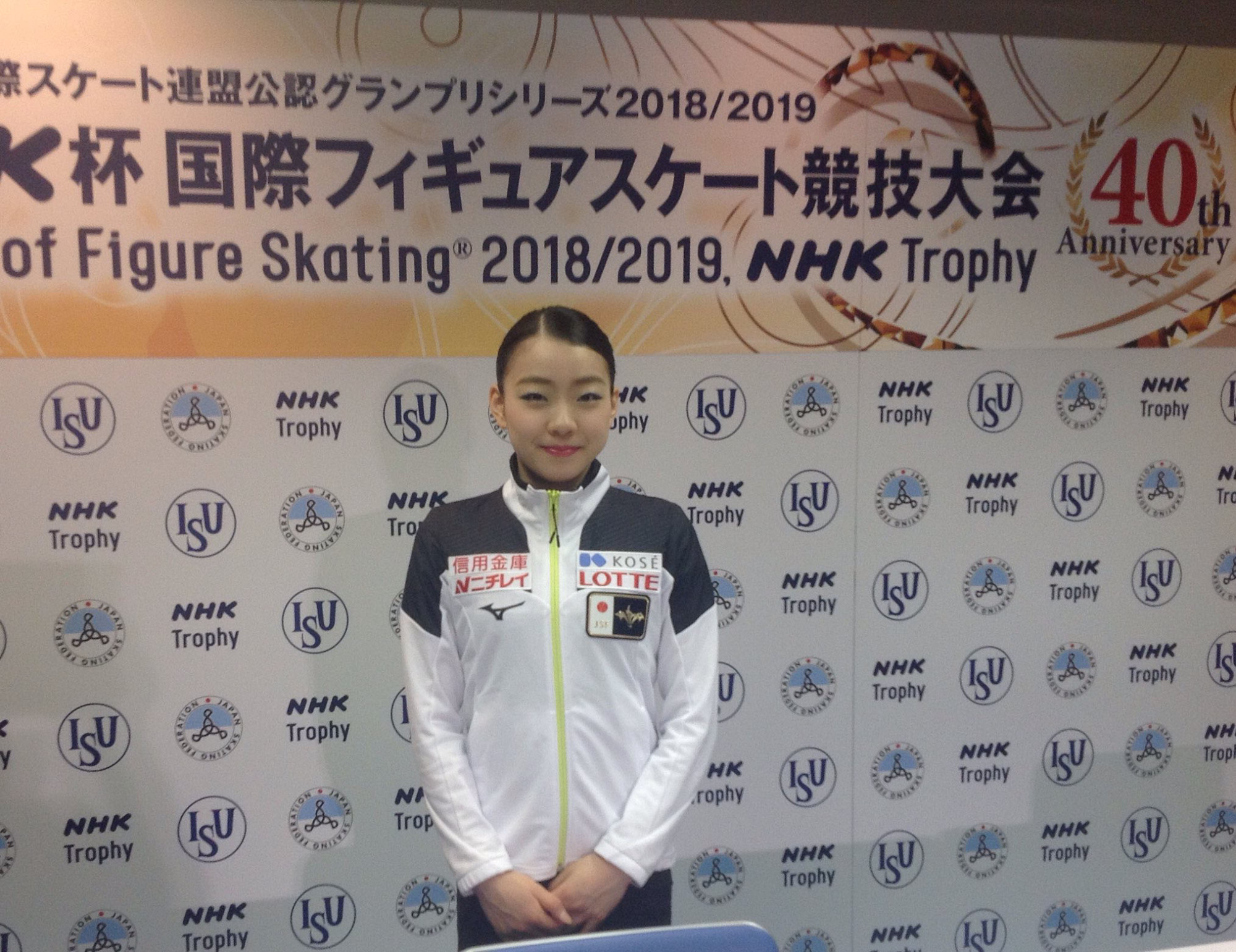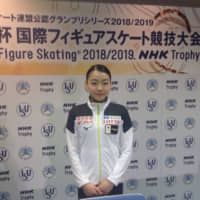Rika Kihira made a great first impression on a great many people with her performance at the NHK Trophy last weekend.
The 16-year-old was nothing short of spectacular in her senior Grand Prix debut, beating a veteran field that included teammates Satoko Miyahara and Mai Mihara, as well as former world champion Elizaveta Tuktamysheva.
Kihira, Japan's junior champion last season, rode her triple axel to victory before the home crowd and almost certainly a place in next month's Grand Prix Final.
It wasn't just Kihira's jumps that resonated with the crowd and the experts, but the total package she presented. She skated with panache and her program components were truly wonderful as she racked up a winning total of 224.31 points.
Eurosport's Simon Reed liked what he saw of the young star.
"Ideal time for her to come on the scene — the first year of the Olympic cycle," stated Reed after Kihira's short program to "Clair de Lune."
"She's got four years really to build up to Beijing."
Despite a fall on her triple axel in the short program, Reed's broadcast partner Chris Howarth was moved by Kihira's poise.
"She's a young girl, but she has a very old head on her shoulders," Howarth commented. "She was so strong for the rest of the program. She put the mistake behind her, focused on the job at hand and just made sure the remaining six elements were as good as she could do them."
Kihira's stunned the veteran observers with her free skate to "Beautiful Storm," which began with her landing two triple axels in the first minute.
Four-time world champion and CBC analyst Kurt Browning made it clear he was watching something special.
"Oh my gosh! What a punctuation mark! Not just the triple axel, but the triple axel/triple toe," Browning said. "Did you see her beautiful posture on that landing? Quality on top of complexity."
Browning cited Kihira's ability to get the most out of her physical effort.
"No wasted energy. As soon as she leaves the ice she's starting to rotate, but she finishes the takeoff up over the top of the foot," Browning continued. "But it's that posture on the landing that is so eloquent."
Browning also sounded a cautionary note in his analysis.
"She did this skate of her life at home, and I'll bet her life just changed," Browning stated. "With that skate and the fact that she is on the map, I hope that the pressure that comes with being a Japanese successful skater doesn't crush her. What a blossoming star."
Browning's fellow analyst Carol Lane was concise with her view of Kihira.
"Beautiful use of body movement in that step sequence. Changes in levels," Lane noted. "Beautiful edge work. Direction changes. Absolutely everything. Maturity plus in such a young person."
Kihira is already plotting ways to boost her scores.
"If I work on my short program, not to lose the level and make no mistakes, I will be able to add five more points," Kihira said on Sunday. "Of course to have a perfect performance with no mistakes will be difficult, but I want to achieve a more perfect performance."
Miyahara set for GP Final
Satoko Miyahara (219.47) took second place behind Kihira with another sublime pair of programs.
Miyahara's jumps were clean during her short program to "Song for the Little Sparrow," where she was second behind Russia's Tuktamysheva.
"Brilliant, absolutely brilliant," said Reed. "All the pressure in the world on Miyahara, especially skating at home, and once again a fantastic response."
Howarth noted Miyahara's rotational velocity, something Ice Time has written about in the past.
"It was a huge skate. I don't think I have ever seen anybody rotate as quick as her," Howarth stated. "I would love to know how fast she rotates. She has got to be in the mid-300s of rpms. It's incredible.
"She's so quick into that rotational position. It's a nice little flick, a little bit of pre-rotation on everything."
Miyahara's free skate to "Invierno Porteno" had some technical issues, with a pair of under-rotations and edge calls, but so enchanting is her skating that it seems almost secondary.
"What we saw was simply magical," Reed remarked after Miyahara was the final skater on Saturday evening. "She looks so delicate, but how strong she must be mentally to produce that under these circumstances."
Howarth admired Miyahara's mettle while under pressure.
"She deserves some extra points just for the mental strength, doesn't she, to come out and do that at the end of the competition," Howarth commented.
Mihara fabulous in fourth
Mai Mihara, who was third after the short program, had to settle for fourth with a total score of 204.20, which would have won Skate Canada and been second at the Helsinki Grand Prix.
It was just a case of bad luck for Mihara to have been part of such a loaded field. Her beauty and elegance were on full display in both programs.
"That program was sensational," Howarth proclaimed after Mihara's short program to "Romance on the High Seas." "Though she didn't have a triple axel, she had a level four on the step sequence and all three spins."
Reed likes Mihara's potential going forward.
"There is no doubt that she is a phenomenal skater with a great future," Reed said after Mihara's free skate to "The Mission." "She interpreted the music so well."
Howarth was amazed by the speed on the rotation of Mihara's jumps.
"She's another young lady that rotates with incredible speed," Howarth commented. "What she lacks in height she gains in the speed of the rotation. Beautiful to look at. Lovely edge quality."
Browning, a legend in his own right, had the highest praise for Japan's skaters as a group.
"If I could describe all of the Japanese skaters, it's that they have an honesty about their skating, a purity," Browning stated.
Uno cruises to triumph
Shoma Uno's victory in the men's competition was almost an afterthought after the stunning show in the women's event.
Uno (276.45) easily won the title over Russia's Sergei Voronov (254.28) and clinched a spot in the GP Final.
The Olympic and world silver medalist over-rotated his quad toe loop and fell in his short program to "Stairway to Heaven" but still had the lead going into the free skate.
"He's got the problem of too much rotation," Howarth noted. "His problem is stopping the rotation, not getting it."
Howarth admired Uno's dedication to seeing a jump through after analyzing his free skate to "Moonlight Sonata."
"You very, very rarely see him open out on a jump. He'll go through, rotate all the time," Howarth analyzed. "Many times fall, many times step out. The commitment to the jump is paramount to him."
Howarth cited Uno's physical gifts and ability to save a jump.
"I take my hat off to him. He is an incredible athlete," Howarth stated. "Champion skaters, the best skaters, are the ones that can land the bad jumps. That is a skill. That is something you got to work at, and that's him."
Hanyu on way to Russia
Two-time Olympic champion Yuzuru Hanyu, who won the Helsinki GP two weeks ago with record scores, will look to join Uno in the GP Final with a podium finish at the Cup of Russia.
Hanyu, who will compete in Russia along with compatriot Kazuki Tomono, will vie for the title with the host nation's Mikhail Kolyada and Canada's Keegan Messing.
Mako Yamashita, who was second at Skate Canada in her senior GP debut, will try to clinch a spot in the GP Final in Moscow where Olympic champion Alina Zagitova will be an overwhelming favorite.
Yuna Shiraiwa and Yura Matsuda will also be in the field. Shiraiwa was named as a replacement for Wakaba Higuchi, who had to withdraw last week due to an injury to her right foot.




